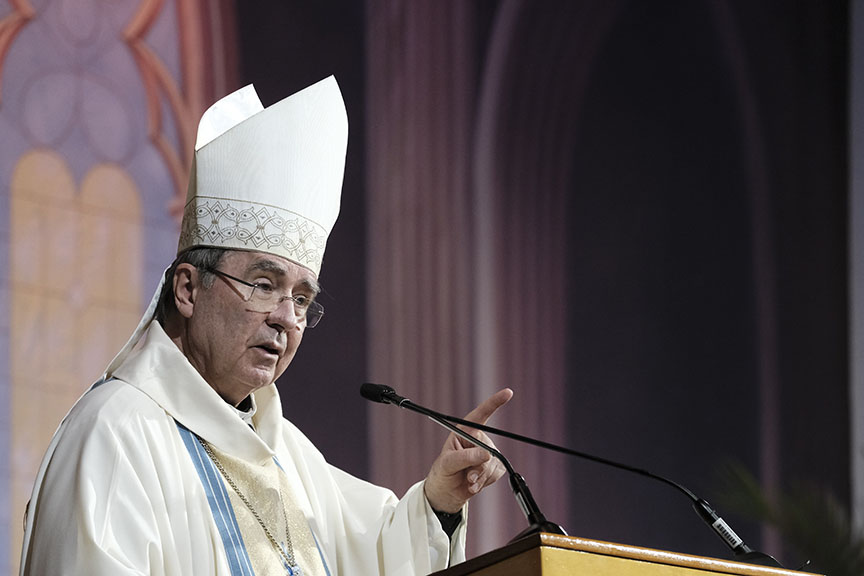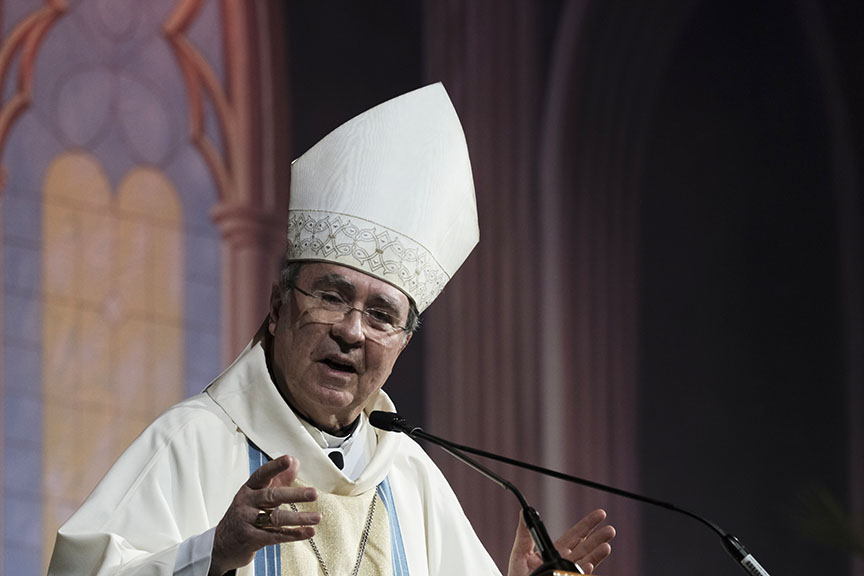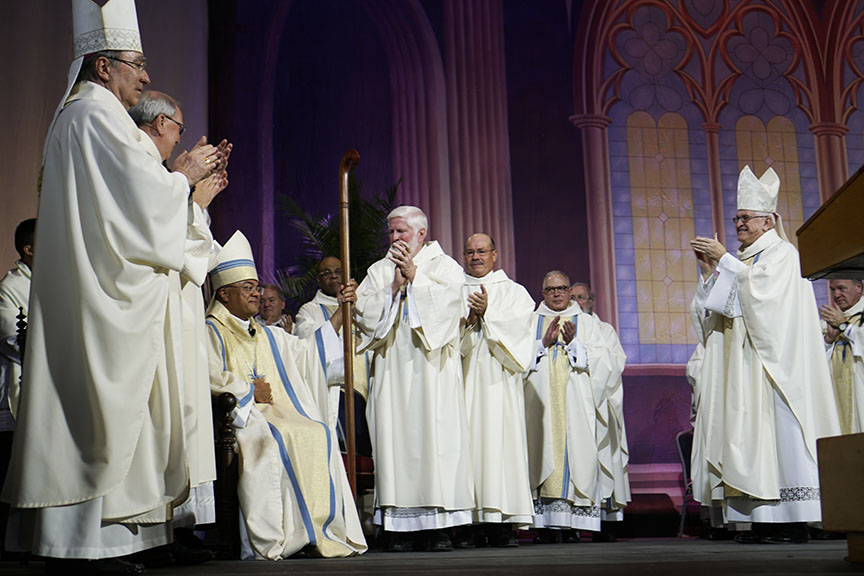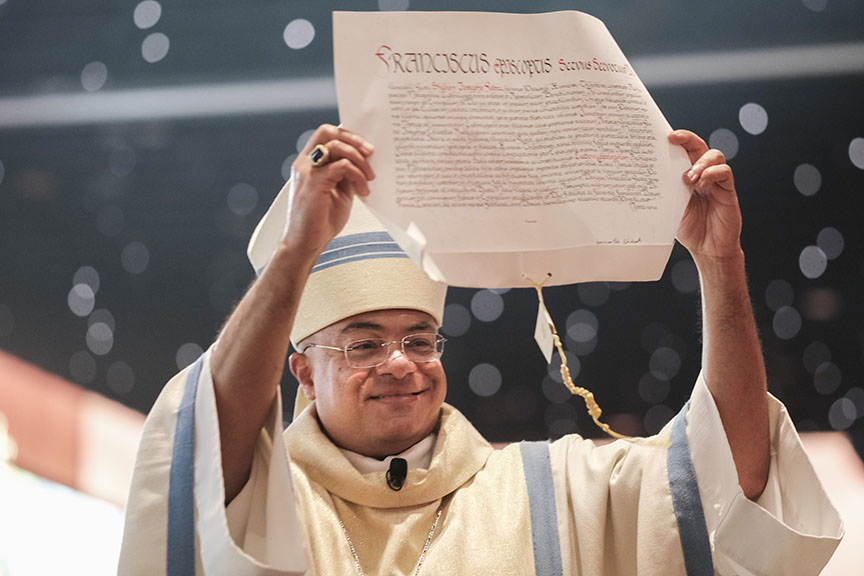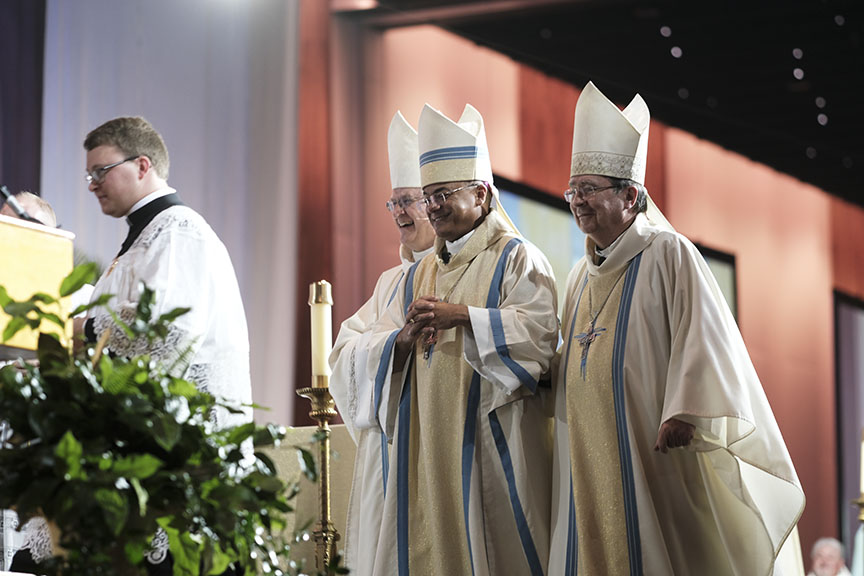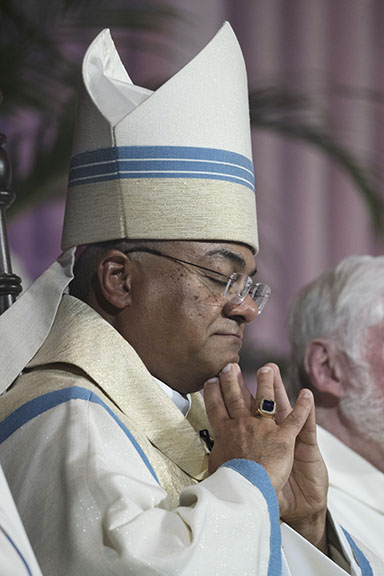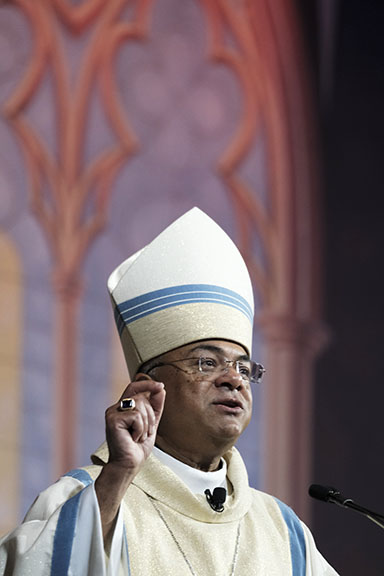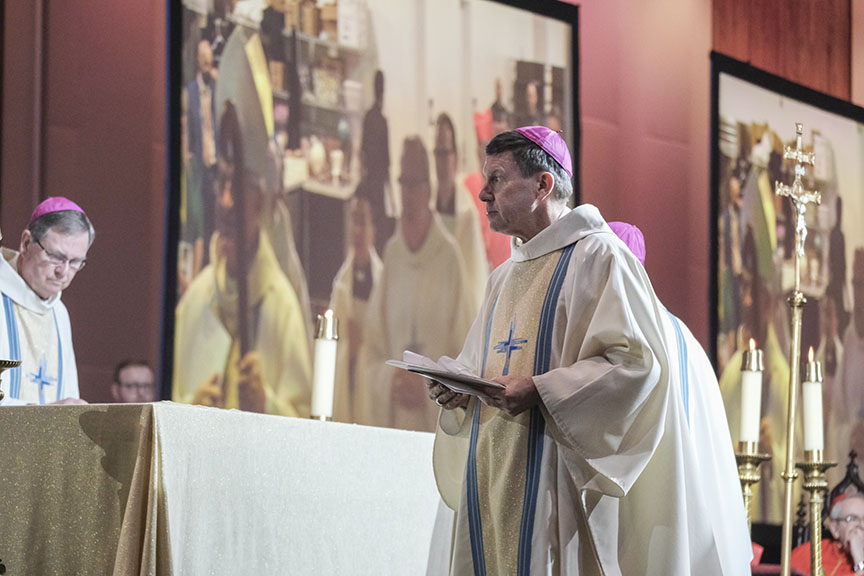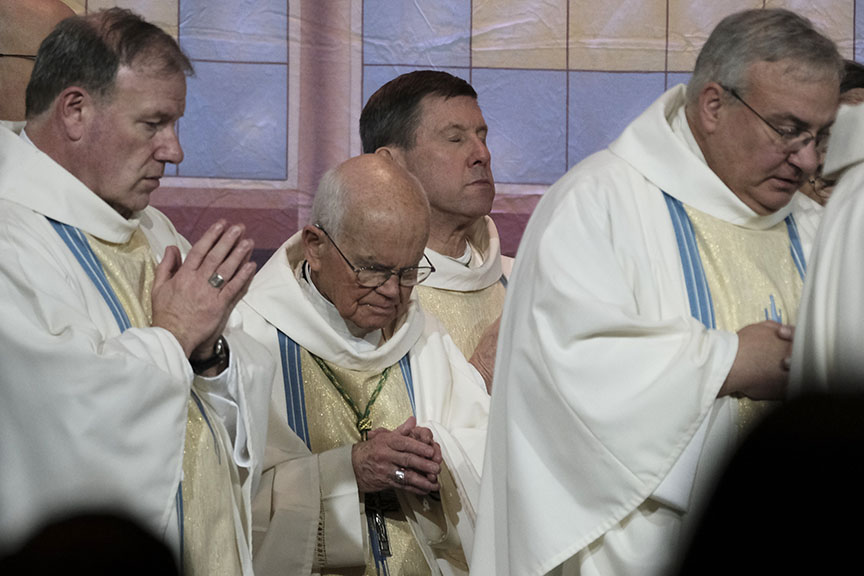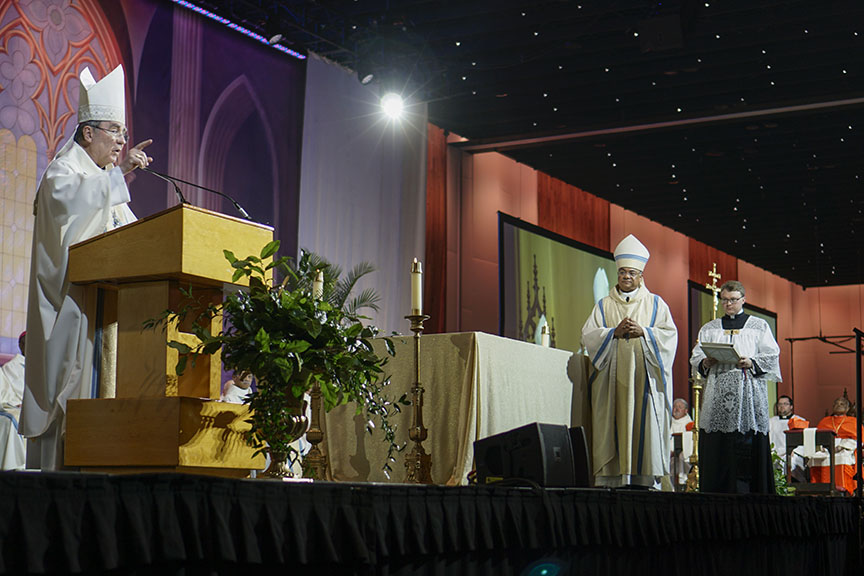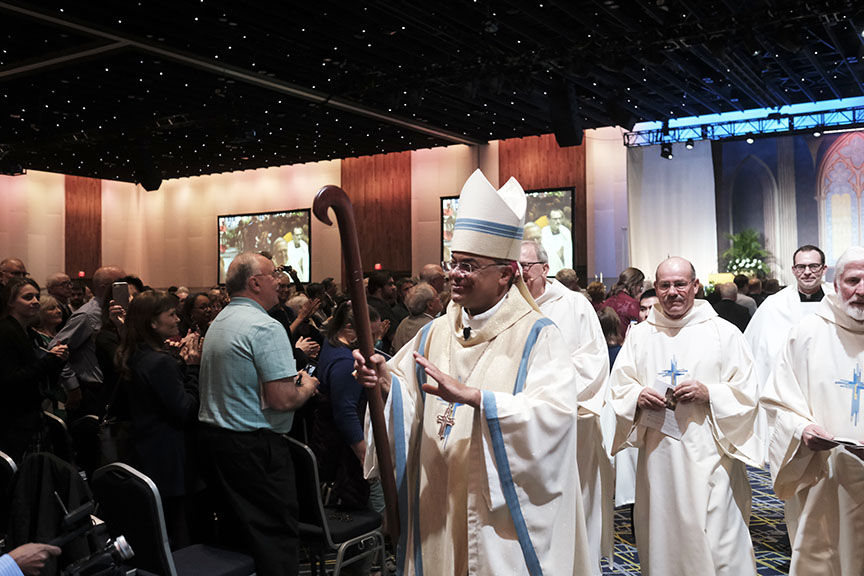
LOUISVILLE, Kentucky. Nearly 3,000 people of the Archdiocese of Louisville, including hundreds of clergy and religious, welcomed their new shepherd, Archbishop Shelton Joseph Fabre, as he became the 10th bishop and fifth archbishop to lead the historic region of central Kentucky on Wednesday, March 30.
He succeeds Archbishop Emeritus Joseph E. Kurtz, who has served as Archbishop of Louisville since 2007.
As Archbishop of Louisville, Archbishop Fabre will serve as the metropolitan of the Louisville Province, which includes the Archdiocese of Louisville and the dioceses of Covington, Lexington and Owensboro in Kentucky and Knoxville, Memphis and Nashville in Tennessee.
Under canon law, the metropolitan has certain limited obligations and authority with respect to the dioceses within his province. Metropolitans are also involved in the selection of bishops, maintaining a list of priests in his province who may be suitable for the office of bishop.
The Mass of Installation, celebrated at the Kentucky International Convention Center in downtown Louisville, began with a reading of the apostolic mandate by the papal nuncio, Archbishop Christophe Pierre.
The nuncio, akin to an ambassador, brought laughter to the ceremony by noting the difficulty of pronouncing Louisville correctly, along with other areas where Archbishop Fabre has served — New Orleans, Baton Rouge and the Diocese of Houma-Thibodaux.
More seriously, he told the congregation and those watching the live stream, “A new era begins.”
He offered gratitude for the service of Archbishop Kurtz, for his time as Bishop of Knoxville, his service in the Archdiocese of Louisville and as a national leader in the U.S. Conference of Catholic Bishops.
“Thank you for decades of dedicated service,” Archbishop Pierre told him.
To Archbishop Fabre, he said, “You have big shoes to fill.”
He encouraged the new archbishop to be close to the people of God and went on to quote part of Pope Francis’ opening speech from the International Conference on the Priesthood Feb. 17.
“Closeness to the People of God, a closeness that, enriched by those other forms of closeness, invites and indeed demands that we imitate the Lord’s own ‘style,’” the nuncio quoted.
“That style is one of closeness, compassion and tenderness, in which we act not as judges, but as Good Samaritans who acknowledge the wounds of our people, their silent sufferings, the self-denial and sacrifices made by so many fathers and mothers to support their families. Who acknowledge, too, the effects of violence, corruption and indifference that, in their wake, seek to stifle all hope.
“A style of closeness that allows us to pour balm upon wounds and to proclaim a year of favor from the Lord. It is imperative to remember that the people of God are hoping to find shepherds in the style of Jesus.”
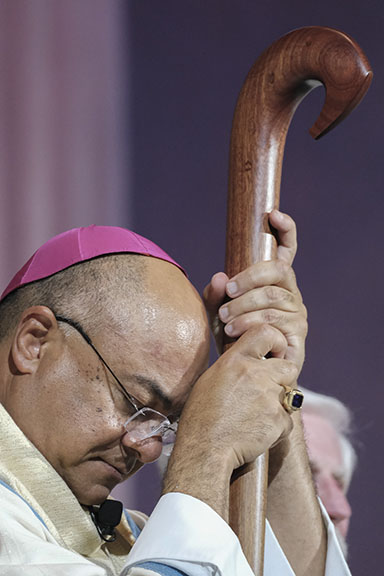
Following his speech, the nuncio presented the mandate to Archbishop Fabre, who showed it to the priests, bishops and cardinals on the platform that served as the sanctuary and then stepped down into the congregation to share it with the assembly.
His formal installation concluded as Archbishop Kurtz and the nuncio guided him to the bishop’s chair — the cathedra — where he received his crozier, a staff of polished wood.
During his homily, Archbishop Fabre picked up the nuncio’s joke and pronounced Louisville as the city’s residents do — Lou-ah-vul — with a laugh, saying, “I practiced and I got it! … May all problems be so easily solved.”
He went on to highlight a theme he also underscored the night before at vespers: unity in Jesus Christ.
He asked the congregation to keep “our eyes focused on him; focused on the things that unite us instead of the things that divide us.” He was answered with applause.
He added that the Archdiocese of Louisville is “rich in cultural diversity” and asked that people stand together “because we are in this together.”
His message was reflected in the day’s prayer and music, which spanned cultures, languages and time periods. Languages included were Vietnamese, French Creole, Tagalog, Korean, German, Malayalam (a language spoken in southwestern India), Swahili and Spanish.
Following Mass, hundreds of people lined up to welcome the new archbishop. He received well-wishers for about two hours in the lobby of the convention center.
Archbishop Fabre was born October 25, 1963, in New Roads, Louisiana. He attended Catholic High School of Pointe Coupee and graduated as valedictorian, the first African American at the school to do so.
He earned a bachelor’s degree in history from St. Joseph Seminary-College in St. Benedict, La., in 1985. From there, he attended Catholic University of Louvain in Leuven, Belgium, where he earned bachelor’s and master’s degrees in religious studies.
In 1989, he was ordained a priest for the Diocese of Baton Rouge, Louisiana, and in February 2007, Archbishop Fabre was ordained an Auxiliary Bishop of New Orleans. In October 2013, he was installed as the Bishop of the Diocese of Houma-Thibodaux in southern Louisiana, some 60 miles southwest of New Orleans.
As a member of the U.S. Conference of Catholic Bishops, he has served on various committees, including the Subcommittee for African-American Affairs and the Committee on Cultural Diversity in the Church.
He currently serves as chair of the Ad Hoc Committee Against Racism. He also oversaw the drafting and implementation of the bishops’ pastoral letter against racism, “Open Wide Our Hearts: The Enduring Call to Love.”
Currently, he serves on the board of Catholic Relief Services and as a consultant to the USCCB’s Pro-Life Committee.
The Archdiocese of Louisville covers 24 counties in Central Kentucky and serves nearly 200,000 registered Catholics in 110 parishes. The Archdiocese was established in 1808 as the Diocese of Bardstown, the first inland diocese on the United States, stretching from the Great Lakes to the Deep South and from the Allegheny Mountains to the Mississippi River. The Diocese of Nashville was carved from the Bardstown diocese in 1837.
In 1841, the seat of the diocese was moved from Bardstown to Louisville, and in 1937 it became an archdiocese.
Marnie McAllister is editor of The Record, the newspaper of the Archdiocese of Louisville.
